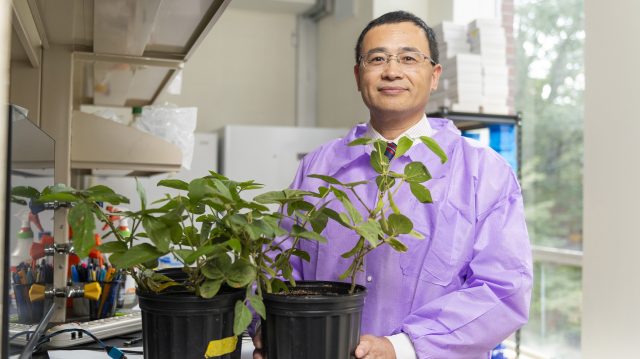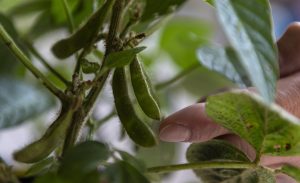Biology chair investigates wild soybeans for resistant properties
FacebookTwitterLinkedInEmailCopy LinkSMSPrintFriendly
UM biologist Sixue Chen is collaborating with researchers nationwide to combat a microscopic roundworm that causes up to 50% of a soybean crop’s yield loss. The project has huge implications for Mississippi farmers, who depend heavily on soybeans. Photo by Srijita Chattopadhyay/Ole Miss Digital Imaging Services
OXFORD, Miss. – A devastating pest for soybean farmers may soon be a problem of the past, thanks to research conducted by a University of Mississippi biologist.
Sixue Chen, chair of the Department of Biology, is collaborating with researchers nationwide to combat a microscopic roundworm that causes up to 50% of a soybean crop’s yield loss.
“We are trying to solve a real-world problem – the soybean is a very important legume crop,” Chen said. “It supplies more than half of the vegetable oil in the world and is a significant source of protein, contributing to foods like tofu.”
Harvest season for the soybean – Mississippi’s second-most valuable agricultural commodity – began in mid-August. Mississippi farmers planted nearly 2.3 million acres of soybeans in 2023, according to the United States Department of Agriculture.
Funded by a five-year Plant Genome Research Program award from the National Science Foundation, the research is targeting resistance to the soybean cyst nematode, or SCN.
“Soybeans are challenged by the soybean cyst nematode, the most devastating pest worldwide causing over $1.5 billion yield loss annually in the U.S. soybean production,” said Bao-Hua Song, lead researcher and biology professor at the University of North Carolina at Charlotte.
“Deploying SCN-resistant soybean varieties is the most efficient and environmentally friendly strategy for managing this damage.”
This approach is challenging, however. SCN populations evolve rapidly, resistance varies by SCN type and current resistant soybean cultivars are losing their resistance due to very limited genetic variation, Song said.
“It’s a tug of war – sometimes farmers will win the war and sometimes the pathogens,” Chen said. “Recently, the variety that farmers are growing has started to lose the war.
“The nematode evolves very fast, and cultivated soybeans have lost a lot of diversity during the domestication process. Breeders really care about yield, and they overlook defense capabilities.”
To tackle this, the research team is “going back to the wild,” Chen said.
“We know there are wild soybeans that maintain a lot of genetic variation, and they are resistant to nematodes,” he said. “We will try to learn from the wild soybean and see what they have in their genetics that gives them a broad spectrum of resistance. That’s what we need in the cultivated soybean.”
Soybeans are Mississippi’s second most valuable agricultural commodity. Researchers are targeting resistance to the soybean cyst nematode, a pest responsible for more than $1.5 billion yield loss annually in the U.S. Photo by Srijita Chattopadhyay/Ole Miss Digital Imaging Services
The scientists are using modern tools to evaluate wild soybeans and compare their genetic makeup to cultivated ones. These methods take significantly less time than traditional genetics, which could take decades, Chen said.
“We have a tool in the lab that we can screen for the functions of these genetic parts of the plant,” he said. “They get generated really fast – within a few days, we know this part is important and it shows a promising effect.”
Once these parts are determined, the team will give these traits back to cultivated soybeans and optimize them so the plants will both defend against the nematode and produce seeds.
Results of the study will deepen the understanding of the molecular basis underlying nematode defense and ultimately enable the development of new and diverse soybean varieties with broad-spectrum SCN resistance, Song said.
“This will positively affect soybean farmers by increasing their yields with less pest spray, which is significant to agriculture and environmental sustainability,” she said.
This project is personal to Chen, who values the opportunity to contribute to solving food insecurity challenges in Mississippi.
“In our state, almost a quarter of people go to bed hungry,” he said. “That is shocking to me. I grew up on a farm really poor in China, and I experienced these issues.
“Half a century has passed since I grew up – and now in the No. 1 country, in the beautiful state of Mississippi, children are still hungry.”
An additional aspect of the grant involves educational outreach that will target college students, as well as train public school teachers in modern biology technologies, such as those used in this research.
“We want to ensure that students from low-income households, first-generation students and minorities have the opportunity to pursue career paths in sciences and make sure they have a better future,” Chen said.
“When I write proposals, I always think of the challenges our state has. Because we work at a university, I think we have a responsibility to our community, our state.”
This material is based upon work supported by the National Science Foundation under Grant No. 2318746 via subaward from the University of North Carolina at Charlotte under 20230623-01-UMS.


